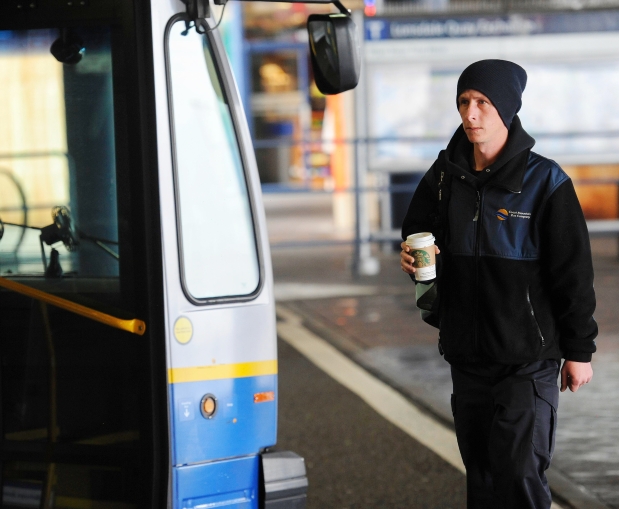While chronically cash-strapped TransLink squeezes the public with fare raises and service cuts, executives will spend significant tax dollars to fund about 300,000 free cups of coffee for head office staff.

The Province learned of the sweet coffee deal by obtaining a request for proposals for a three-to-five-year contract, posted on the B.C. Bid website.
The raw amount of commodities called for is stunning. Providers will deliver more than 5,000 pounds of coffee per year; 500 million grams of sugar; 52,000 bags of Orange Pekoe and 8,000 bags of herbal tea; 125,000 stir sticks; 3,500 litres of milk, and about 300,000 creamers.
The contractor will supply and deliver equipment including brewers and thermal carafes to TransLink’s four head offices and maintain the equipment, the documents say, for a multi-year contract expected to start in June.
Among other terms, the documents say “the contractor should provide tastings, at their own cost,” and “other related beverage services, as required, by TransLink.”
The bid document does not list guidelines for the expected value of contracts, but an industry source told The Province: “This is going to be a good contract for someone. That’s a lot of money for TransLink to pay, for a luxury.”
The coffee company owner interviewed by The Province, who did not want his identity revealed for business reasons, almost spit out his java when told of TransLink’s demand for 5,000 pounds of medium and dark roast coffee, with 30 pounds of Decaf thrown in.
- Effluent spill at Quesnel, B.C. factory poses no ‘acute risk’: Environment ministry
- Three B.C. men fined, banned from hunting after killing pregnant deer
- B.C. child-killer’s attempt to keep new identity secret draws widespread outrage
- Inquest hears B.C. hostage was lying on her captor before fatal shooting
“That’s fricking huge,” he said. He estimated 5,000 pounds of coffee would make at least 250,000 cups per year. The man said he pays about $10 a pound for his coffee supply, but others in the business pay about $18 per pound for the high-end stuff.
The coffee businessman interviewed by The Province said it is difficult to estimate the total value of TransLink’s coffee service contract, but with the sheer amount of coffee, tea and fixings demanded (including 63,000 disposable cups), added to the equipment servicing and inventory management demanded of the contractor, it would be fair to guess an annual fee of about $1 per beverage cup served. According to The Province’s rough analysis, the total fee could reach $300,000 per year. If the contract ran for five years, total value might be $1.5 million.
TransLink spokesman Derek Zabel confirmed in an email that the coffee service is intended for head office employees at four locations: Coast Mountain Bus Co., West Coast Express, B.C. Rapid Transit Co. and TransLink.
Answering questions from The Province in emails, Zabel said some of the coffee goes to guests and politicians visiting for meetings with transit officials, and the proposed contract is seen as more “cost-effective” than catering.
“We follow a provincial procurement process and there is a live (request for proposal) at the moment, and therefore we are unable to provide the value you requested,” he wrote. “To your questions about rationale business case for coffee and TransLink’s need to be cost effective, this is a cost of doing business.”
But Canadian Auto Workers local 111 president Don MacLeod questioned why executives should quaff free coffee when bus drivers buy their own java while on the job, “just like the average working people.”
Jordan Bateman, B.C. director of the Canadian Taxpayers Federation, suggested TransLink’s coffee contract smacks of entitlement.
“This tells me a lot about their priorities, which are the comfort of executives,” Bateman said.
“I’m sure the taxpayers would rather the money was spent on front-line service. I wonder what the bus drivers running to Starbucks on their 10-minute breaks think about it.”
At the Lonsdale Quay bus terminal on Friday, a number of bus drivers were seen rushing to buy coffee on breaks and legging it back to buses cup in hand. They were asked for comment on this story, but none wanted to be identified.
Pointing to a frequent-buyer coffee card, one driver laughed and said, “The only way I get a free coffee is after I buy six of these.”
Despite having rearranged and reduced some transit routes to find savings in 2012, TransLink faces a $30-million annual funding shortfall that it had hoped to address with more property tax money.
The region’s mayors refused to raise property taxes to pay for shortfalls, while B.C.’s government denied the mayors’ proposal to raise cash through vehicle and carbon taxes — stalling regional transportation expansion plans seen as key to the province’s economic growth.
The Province sought interviews on TransLink’s executive coffee splurge with two key voices on the Mayors’ Council on Regional Transportation, District of North Vancouver Mayor Richard Walton and Surrey Mayor Dianne Watts, but the politicians did not respond.



Comments